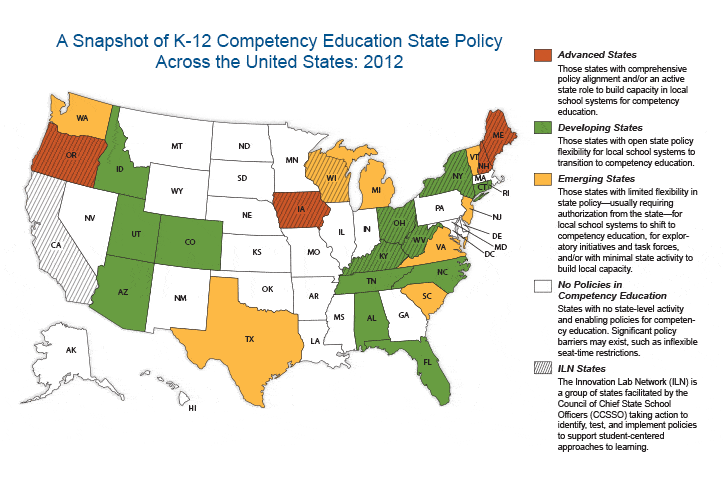iNACOL Testifies in Minnesota to Support Competency-Based Education
Education Domain Blog

The Minnesota Senate Committee on E-12 Finance and Policy held a hearing this week to consider SF 485, a bill which would specifically and explicitly recognize competency-based education models in Minnesota.
iNACOL staff testified in favor of the bill, joining the bill’s sponsor, E-12 Finance and Policy Chair Senator Carla Nelson, and representatives from Education Evolving, KnowledgeWorks, and the Minnesota Association of School Administrators. Several school districts implementing competency education also submitted letters of support to the committee. Jason Berg, Executive Director of Educational Services at the Farmington Area Public Schools wrote that personalized, competency-based education “allows districts to make equity our pedagogy.”
Education Evolving’s Policy Director Krista Kaput testified that in conversations with stakeholders, “We also heard from these schools that it was important for statute to definitively permit their work — namely, make it explicit that district and charter schools can certify standards and award credit to students who demonstrate mastery of competencies that are aligned to state standards, regardless of their time in classroom instruction.”
“This message was reiterated by district schools that had been and still are considering moving towards competency-based education,” Kaput continued, “but have been hesitant to do so because statute doesn’t explicitly permit it.
“Senate File 485 meets this need. It clearly states that a district or charter school may adopt a locally developed competency-based education plan that allows students to meet academic standards, earn credits, and advance to higher levels of learning by demonstrating mastery of required state standards, regardless of the time or pace of learning.”
The following is an excerpt of testimony that iNACOL Policy Director Natalie Truong and I delivered to the committee:
“iNACOL is here in part thanks to an Ecosystem Grant from the Bush Foundation to partner with educators and advocates in Minnesota in this work, such as Education Evolving. [We] have been asked to provide a national perspective to the committee.
“Competency-based education systems move away from the traditional seat-time-based, one-size-fits-all model of schooling. Competency-based education models will ensure students are ready for a 21st-century economy and can succeed in college, career and civic life.
“In 2011, 100 innovators in K-12 education came together at a summit, convened by iNACOL and the Council of Chief State School Officers (CCSSO), to develop and fine-tune a working definition of high-quality, competency-based education, which is as follows:
“Competency-based education is a system where:
- Students advance upon demonstrated mastery.
- Competencies include explicit, measurable, transferable learning objectives that empower students.
- Students receive timely, differentiated support based on their individual learning needs.
- Assessment is meaningful and a positive learning experience for students.
- Learning outcomes emphasize competencies that include application and creation of knowledge, along with the development of important skills and dispositions.
“Senate File 485 is informed by this field-tested definition of competency-based education and would ensure that locally developed, student-centered models that are already developing across Minnesota are explicitly able to move forward and that new schools will be able to begin the work. As Krista Kaput from Education Evolving testified, the bill reflects the input of local educators, students, and leaders from around the state.
“This is part of a national trend of state leaders recognizing and supporting competency education with policies that provide educators room to innovative and support capacity for high-quality learning. I would like to share two maps that show the growth of these enabling and supportive policies since we began tracking them in 2012. As you can see from the proportion of states that are shaded in between 2012 and 2018, this is a growing movement, driven by local educators and leaders.”
The Committee will vote on whether to include SF 485 in the Senate’s omnibus education bill. To become law, the bill would need to pass a vote of the full Senate and in the House.
Maria Worthen is iNACOL’s Vice President for Federal and State Policy.
